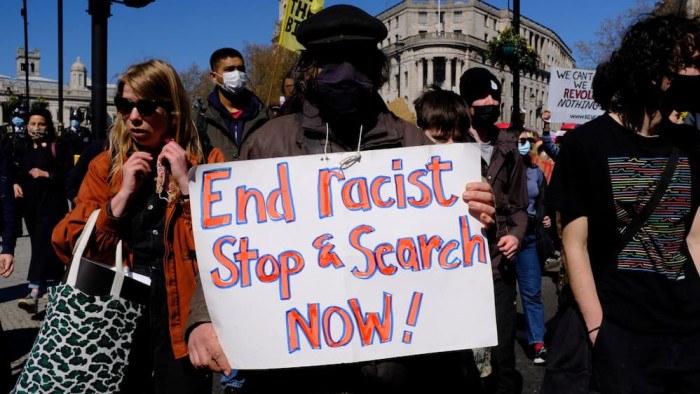
New data shows more than three quarters of stop and searches in England and Wales do not lead to arrest
- Stop and searches have increased 24% on the previous year, the most stop and searches since the year ending March 2014
- Just 77% percent of stop and searches actually result in arrest
- Individuals from a Black or Black British background were searched at a rate seven times higher than that of those from a White ethnic group
The police powers and procedures: stop and search and arrests in England and Wales, an annual dataset for the year ending 31 March 2021, was published today by the UK Government’s Home Office. Stop and search powers clearly engage and in some cases are likely to infringe fundamental rights, including but not limited to the presumption of innocence, right to a fair trial and protection from non-discrimination.
Increase in stop and searches
There has been an increase in stop and searches conducted under section 1 of the Police and Criminal Evidence Act 1984 (PACE) (and associated legislation). This year there were 695,009 stop and searches, an increase of 24% on the previous year, and the most stop and searches since the year ending March 2014 (872,518) before the introduction of the Best Use of Stop and Search scheme (BUSS).
The data also shows that for three quarters (77%) of cases, no further action was taken. Just 73,391 searches actually led to an arrest, 8% higher than the previous year, but a lower rate (11%), down 2 percentage points on 2019/20
Rise in stop and searches of all ethnic groups
According to the data, the increase in the use of stop and search over the last year was seen across all ethnic groups, with the largest volume increase shown for White individuals (26%). For the first time, the Home Office have collected stop and search data on both the officer observed ethnicity and the self-defined ethnicity of the person searched, for individual records. ‘This means that if the self-defined ethnicity of the person searched was not stated, officer-observed ethnicity can be used as a proxy, for analytical purposes’. It is worth noting that 1 in 5 individuals searched do not have their ethnicity recorded. This statistic has increased since 2014, when it was 1 in 20. Where ‘officer-observed ethnicity’ is used instead, racial disparity rates rise, significantly for Black people at a rate of 8.7 times more (compared with 7.1 for self-defined ethnicity).
Delay prevents transparency, scrutiny and accountability
The statistics were due to be released in October 2021, however the UK Home Office delayed publication in the public domain by weeks until 18 November 2021, while the Police, Crime, Sentencing and Courts Bill (PCSC Bill), which expands stop and search powers, passes through Parliament. The data covers part of the first lockdown when the Metropolitan police increased stop and search (section 60) despite a fall in crime.
Fair Trials work to end suspicion-less stop and search
Fair Trials is partnering with other human rights charities to advocate for the repeal of section 60 suspicion-less stop and searches in England and Wales, as this law currently allows police to stop and search anyone in a given area for a set period of time without needing reasonable grounds to suspect they’ve committed a crime.
The PCSC Bill is currently passing through UK Parliament before it becomes enacted in law. Part 10, Chapter 1 of the PCSC Bill establishes Serious Violence Reduction Orders (SVROs). An SVRO is a civil order that can be imposed on any individual over the age of 18 on the basis of a previous conviction. Part 10, Chapter 1 gives a new power to the police to stop and search anyone subject to an SVRO whenever they are in a public place, without needing to form reasonable suspicion of criminal wrongdoing effectively an individualised, suspicion-less stop and search power.
The Code of Practice for statutory powers of stop and search, PACE Code A, states that police cannot use the fact that the person is known to have a previous conviction as a basis for a stop and search. Such a constraint seeks to tie reasonable suspicion to factors which are relevant to the likelihood that a person has committed a specific offence, rather than attempts to reduce people to their past behaviour. SVROs on the other hand, which the court can impose via a low standard of evidence, are tied precisely to a person’s previous conviction. The Bill makes clear that it does not matter whether the evidence considered in deciding to make an SVRO would have been admissible in the proceedings in which the offender was convicted.
The Government’s recently-announced Beating crime plan will, amongst other things, permanently relax existing BUSS voluntary and minimal safeguards relating to section 60 stop and search powers. By removing safeguards which were introduced in 2014 to address racial disproportionality, and by increasing stop and search powers, the UK Government ignores its own findings that people from black, Asian and ethnic minority groups, in particular black people, who are subject to an SVRO are more likely to be searched in practice. The Bill seriously compounds the discrimination faced by marginalised communities and exacerbates the disparities that already exist throughout the criminal justice system.
Fair Trials continues to advocate for the non-introduction of SVROs and repeal of section 60 suspicion-less stop and search powers to guarantee protection of fundamental rights and prevent discrimination in the criminal justice system.


